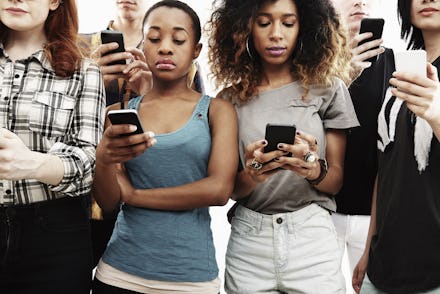The Ingenious Tricks Real People Use to Keep Phones From Ruining Friendships

It's a familiar scene: A few friends sit down for a meal. They chat, laugh, order, take bites, sip water. But at a certain point, there's a lull in the conversation, and one friend pulls out his smartphone, quickly checking his notifications. Before long, everyone joins in. The conversation comes to a halt, punctuated by taps.
We so rarely unplug from our phones that even the most basic and important of human interactions — spending time with our friends in real life — becomes a test of willpower. It's us against our impulse to see our screens light up.
It's a test many of us fail. But for some, unplugging while in the company of friends has become a challenge they relish — and often win.
The phone police: Allana, 22, told Mic she plays bad cop with her friends. She confiscates their phones at the beginning of the meal and only returns them if a parent calls. It started when one friend wouldn't stop texting her boyfriend at home while they were out, so Allana simply took the phone away. "I made it a rule," she said, "because the two of us went out to eat a lot."
Others take the physical separation a step further. Alexa, 25, told Mic that she leaves her phone in another room or in her bag. She argued that it alleviates her FOMO, or fear of missing out.
"I noticed that even if my phone [was] face down and on vibrate, I [could] still hear it, and it's so easy just to turn it around and see what the notification is," she said. "It was easier for me to put my phone in another area or leave it in my bag."
Our phones have become like a bionic appendage — always present, always waiting, always there to feed our boredom.
Some friends like to add a little mischief — and monetary incentive — to the game.
The "phone in the cup" game: Kelly, 24, told Mic that she follows a rule for eating out: Each person puts their phone in a cup. The first person to reach for it during the meal pays for it all — no matter who the friend is. It's a similar strategy to Smartphone Roulette, which requires participants to place their phones in the middle of the table, and whoever touches theirs first covers the entire check. (For those who want to go the charitable route, one UNICEF program will donate enough money to supply a child with an entire day of clean water if you go 15 minutes without touching your phone.)
Not everyone is cool being physically separated from their phones, though. Some unpluggers will simply shut off their phone's ability to send notifications — they'll utilize Night Mode or Airplane Mode or turn off alerts for specific apps. Others will switch off the device altogether.
They're doing it to preserve a connection. Our phones have become like a bionic appendage — always present, always waiting, always there to feed our boredom. But if your thumbs are glued to a phone, you miss out on the moments that facilitate meaningful human bonding.
"I don't think we realize how much we miss by spending time on our phones rather than actually experiencing," Kate, 20, said to Mic. "We choose to partake in whatever activities we're involved in. Why not actually invest our attention in these activities?"
"When you go to a meal, you're there to talk and eat, not text and Facebook," Allana said. "If I see a group of people sitting at a table all just staring at their phones, it's like, what the hell?"
Emily, 22, noted to Mic that she unplugs only with close friends, lending credence to the idea that it's a behavior we reserve for those with whom we genuinely care about maintaining a friendship. With people she's not as close with, Emily feels "a little nervous about how they would react" to a forced unplugging. "I wouldn't want them to [see me as] this controlling freak."
"I have a special appreciation for when I notice that the people I spend time with connect with me rather than with someone on the other end of their phone," Kate told Mic.
Of course, not everyone feels this way. Jack, 25, takes special pride in finding someone who, like him, is married to his phone.
"When I meet someone who also pulls out their phone mid-conversation, I feel so relieved. It's like we can both share in the indulgence guilt-free," he told Mic. "Besides, it adds a breath of fresh air into the conversation." He's thought a lot about this: "Checking your phone is like putting a comma in the run-on sentence of painful human interaction, for which the only period is death."
Let's take a cue from these unplugging crusaders. Allana says her relationships have improved since she started demanding her friends unplug with her. Disconnecting from your device "makes you talk more," she said. "And once people start doing it, they see the benefit — even the ones who resisted. People [start] listening more. When you don't have your phone to fall back on, I think, the conversations become richer."
After all, messaging someone else in the company of a friend is like cracking open a book or interrupting a conversation in order to speak with someone else. It's not acceptable when it's not a phone, so it shouldn't be acceptable when it is.
Yet it doesn't have to be this way. As Emily put it, "Instagram, Facebook and Twitter feeds are not going anywhere tomorrow if you don't check it today."